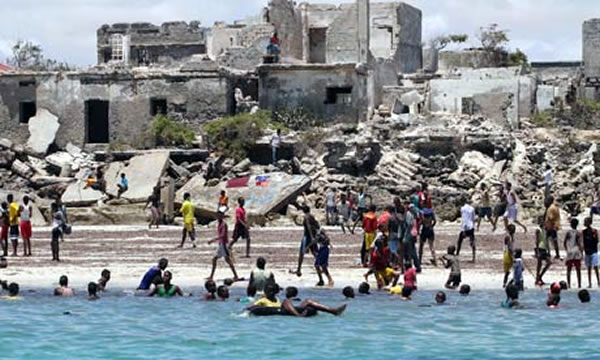

Sunday, October 21, 2012
Hotels and restaurants are open for business, families are back on the beach and the first launderette for 20 years is welcoming dirty linen.
Now comes further evidence that life in Mogadishu, the capital ofSomalia, is approaching something like normality: the national stadium will be used for playing football instead of war.
The African Union peacekeeping force, Amisom, has said it hopes to leave its base at the stadium in time for a football tournament in December.
The movefollowed a call by the Somali Football Federation (SFF) for the bullet-scarred venue to return to its original calling after two decades of occupation by various soldiers, warlords and rebels.
The 35,000-capacity Mogadishu stadium was built by Chinese engineers in 1978 and staged concerts, sporting events and political rallies. The SFF website claims that at "one time it was the largest and the most beautiful facility in Africa and the Arab world", hosting international tournaments including the All Arab games and All African games.
But the stadium was occupied when Somalia's civil war erupted in 1991 and has since been a base for armies and militia whose graffiti still scars the crumbling walls. In January 2007 it fell into the hands of Ethiopian forces who were based there until early 2009.
It was then controlled by the Islamist militant group al-Shabaab, which used it as a training base – the pitch became a firing range. The group bans the playing and watching of football in areas it holds.
Al-Shabaab was driven out of the capital by Amisom in August last year. The stadium has since been home to thousands of Amisom peacekeepers supporting the Somali government. The former changing rooms were used by soldiers for donating blood and other preparations for battle. Pictures on the SFF website from 2009 show huge bushes growing on the pitch. "If you get inside the stadium you will feel like that you are in forest," it says.
Mogadishu is enjoying a precarious but discernible uplift in security, including last month's election of a president and parliament, and the capture of al-Shabaab's last stronghold, the port city of Kismayo.
Col Ali Hamud, an Amisom spokesman, said some public buildings and areas, including the stadium, had to be used by Amisom for security reasons. "Now the time has come to leave those infrastructures to the youth," he told the BBC Somali service.
Unless "technical issues" arose, Amisom should have enough time to prepare to move elsewhere by December, the colonel added.
SSF officials visited the stadium earlier this week. Abdi Qani Said Arab, its secretary general, said: "This is time to get the Somali soccer facilities back into the SFF hands, because our football is now recovering from years of conflicts and all soccer facilities must get back to our hands."
Football can play a vital part in disarming child soldiers and "creating friendship among people", he added.
Somalia's national football team, nicknamed the Ocean Stars, are currently forced to play all matches away from home. They are ranked 188th in the world by Fifa.
Thousands of Somali expats have poured back into Mogadishu with numerous buildings now under construction. However, sporadic suicide bombings and assassinations continue. The head of the SSF and the president of the Somali Olympic committee were among eight people killed in a bomb attack on the national theatre when it reopened in April.